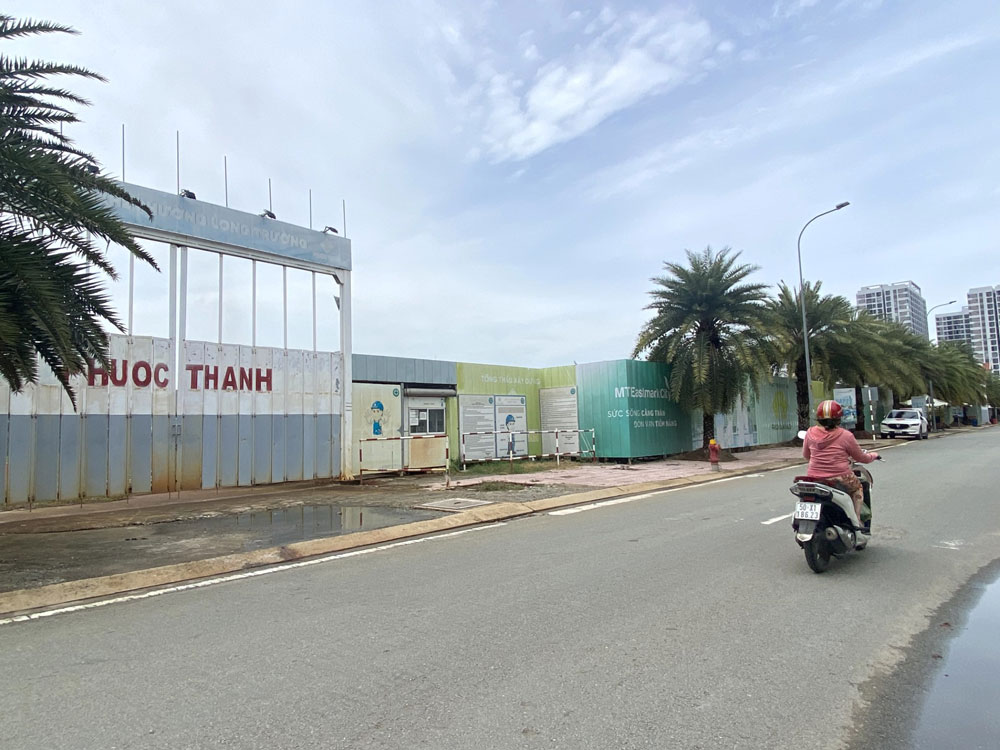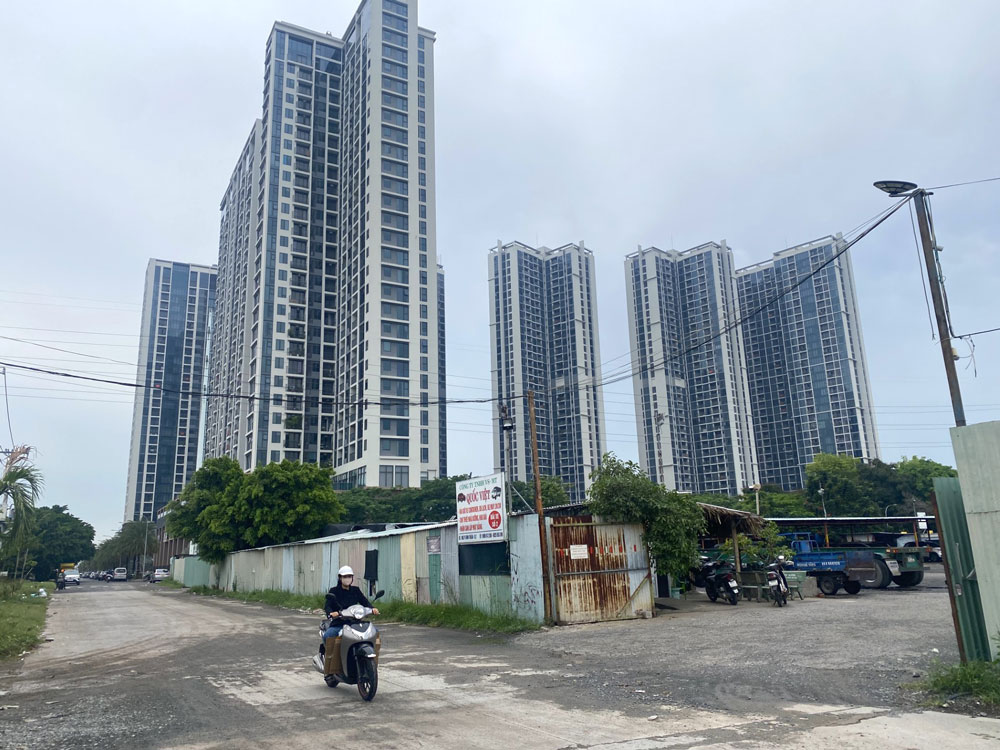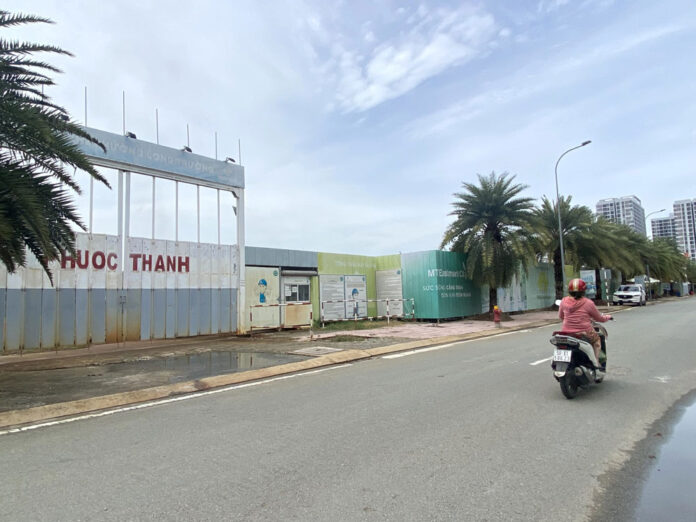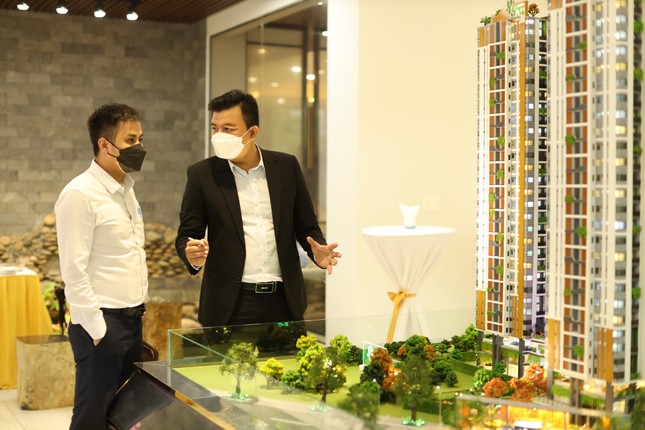The State of Social Housing Projects in Ho Chi Minh City: A Call for Action
Last weekend, after the heaviest rain of the year, a reporter from NLD Newspaper returned to a social housing project in Long Truong Ward, Thu Duc City. This project, which broke ground three years ago, was intended to provide nearly 600 apartments for low-income earners, complete with full amenities and quality comparable to commercial housing projects. It reflected the developer’s commitment to the Ministry of Construction’s directive to enhance the quality of social housing and improve living standards for laborers.
Projects in Limbo
Despite good intentions, the current reality at the construction site tells a different story. The area is enclosed by tall fences, beyond which lies an empty plot of land littered with concrete piles, wild grasses, and muddy puddles. The absence of machinery and workers indicates no signs of activity, contrary to reports from authorities labeling it as a “project under construction.”

Long Truong Ward social housing project awaits its fate behind enclosed fences
Just 3 kilometers away, another project that was envisioned to offer a new generation of social housing with Singapore-inspired designs, ample amenities, green spaces, and a guaranteed quality of life, faces a similar fate, if not worse, as it hasn’t even begun construction.
Meanwhile, the worker accommodation project at Linh Trung II Export Processing Zone (phase 2), which began with test pile driving three years ago and was planned to provide over 350 rental apartments, has also stalled.
Crossing the Phu My Bridge into District 7, we arrive at the MR1 social housing project in the Tan Thuan Tay residential area, consisting of over 700 apartments. Unfortunately, this site is no different, currently serving as a parking lot and construction material sales area, with no signs of construction in the near future.

The stagnant site of the MR1 social housing project in District 7
Prioritized Solutions
Based on Ho Chi Minh City’s housing development program for 2021-2030 and the government’s initiative to build at least 1 million social housing units for low-income earners and industrial workers, the city aims to develop approximately 69,700-93,000 social housing units by 2030, with a target of 26,200-35,000 units by 2025.
Additionally, according to the Government Office’s announcement No. 120 dated March 18, 2025, the Prime Minister has assigned Ho Chi Minh City to complete 100,000 social housing units by 2030.
Regarding the implementation of these goals, the Ho Chi Minh City Department of Construction shared that from 2021 to the first quarter of 2025, the city has constructed and completed 6 projects comprising 2,745 apartments. Four projects with 2,874 apartments are currently under construction and are expected to be finished by the end of this year.
To strive towards the target set by the Prime Minister, the Department of Construction plans to advise the Ho Chi Minh City People’s Committee on several solutions. These include continuing to provide feedback and implementing Resolution 98/2023 of the National Assembly to promote social housing development.
Additionally, they will collaborate to create housing policies for specific groups, such as armed forces, civil servants, doctors, teachers, artists, industrial workers, and residents living on and along canals.
Furthermore, the department will continue to advise the Ho Chi Minh City People’s Council on issuing a resolution regulating the mechanism to support investors in constructing social housing using the city’s budget funds.
Another critical piece of advice for 2025 is to focus on resolving legal procedural obstacles and expediting the progress of social housing projects, prioritizing those with a scale of over 1,000 units.
Unraveling Obligation Complications
The Ho Chi Minh City People’s Committee clarified that the regulation mandating a minimum land area for developers to allocate 20% of the total residential land for social housing construction is no longer in effect. Currently, the law only stipulates that investors in commercial housing projects must dedicate 20% of the land area invested in technical infrastructure development to social housing construction, which falls under the decision-making authority of the Ho Chi Minh City People’s Committee.
As Ho Chi Minh City is a special urban area, social housing must be in the form of apartment buildings constructed according to approved detailed construction planning…
To address complications and ensure transparency in determining the form of social housing obligations in commercial housing projects during the investment policy approval process, the Chairman of the Ho Chi Minh City People’s Committee proposed that the Party Committee of the Ho Chi Minh City People’s Committee consider and approve the Department of Construction’s suggestion. This suggestion involves fulfilling social housing obligations by paying an amount equivalent to 20% of the total residential land area invested in technical infrastructure development, as proposed by the investor.
The Chairman of the Ho Chi Minh City People’s Committee also proposed considering each investor’s suggestion regarding the allocation of social housing land funds within the scope of their commercial housing projects or fulfilling social housing obligations at alternative locations. This ensures alignment with the approved housing development program and plan for Ho Chi Minh City.
Nearly 2,316 Units to be Completed Soon
To achieve the social housing development target for 2030, Ho Chi Minh City has registered with the Ministry of Construction for the 2025 social housing development target. This includes 3 projects expected to be completed, providing 2,316 units; 8 projects planned for commencement, offering 8,000 units; and 5 projects awaiting investment approval, aiming for approximately 20,000 units.
The city is also reviewing the allocation of concentrated social housing construction land to be incorporated into the city’s master plan, in addition to regulating the allocation of land funds from commercial housing projects.
The New West Side Story: Binh Chanh’s Rise in the Urban Restructuring Race
The heart of Ho Chi Minh City (District 1 and District 3) is congested, and the rise of new central hubs is inevitable for restructuring this modern metropolis. Following the success of Thu Duc City, Binh Chanh is rapidly establishing itself as the next growth pole, boasting both scale and a visionary development plan.
A New Urban Area: Binh Quoi-Thanh Da Revitalized
The Ho Chi Minh City People’s Committee has requested that the time frame for preparing the task of adjusting the 1/2000 subdivision planning must not exceed one month. Additionally, the time frame for preparing the proposal for adjusting the 1/2000 subdivision planning should not exceed nine months.
The Inferno at the Six-Story Hotel in Ho Chi Minh City
“A massive fire engulfed the sixth floor of the expansive The AIcove hotel, spanning over 1,000 square meters. The blaze, which started on the sixth story, quickly became an emergency situation as the flames rapidly spread through the building.”





















